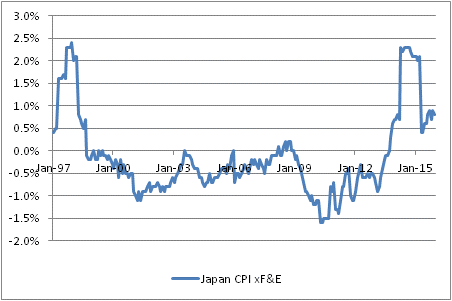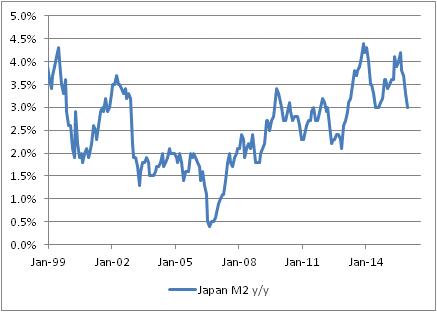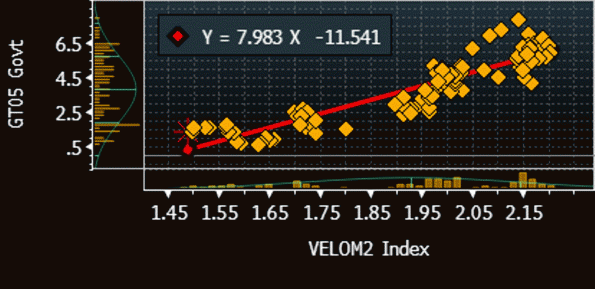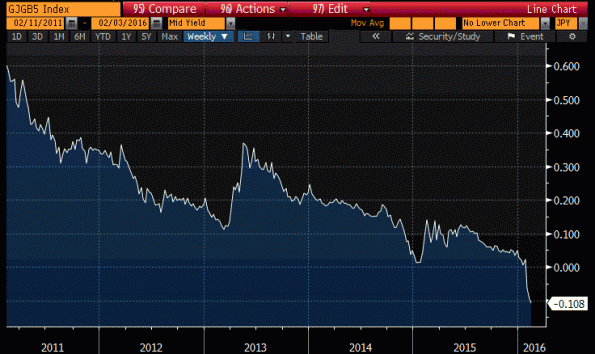The news on Friday, that the Bank of Japan had joined the ECB in pushing policy rates negative, was absorbed with brilliant enthusiasm on Wall Street. At least, much of the attribution for the exceptional rally was given to the BoJ’s move.
I find it implausible, arguably silly, to think that a marginal change in monetary policy by a desperate central bank on the other side of the world – however unexpected – would have a massive effect on US stocks. Subsequent trading, which has reversed almost all of that ebullience in two days, suggests that other investors also may agree that just maybe the sorry state of earnings growth rates in this country, combined with a poor economic outlook and still-lofty valuations, should matter more than Kuroda’s gambit.
To be sure, this is a refrain that Ben Bernanke (remember him? Of helicopter infamy?) was singing last month, before the Federal Reserve hiked rates impotently, and clearly the Fed is investigating whether negative rates is a “tool” they should add to their oh-so-expansive toolbox for fighting deflation.
Scratch that. The Fed no longer needs to fight deflation; inflation is at 2.4% and rising. The toolbox the Fed is interested in adding to is the one that contains the tools for goosing growth. That toolbox, judging from historical success rates, is virtually empty. And always has been.
Back to Japan: let me point out that if the BOJ goal has been to extinguish deflation, it has already done so. The chart below (source: Bloomberg) shows core inflation in Japan for the last 20 years or so. Abstracting from the sales-tax-related spike, core inflation has risen fairly steadily from -1.5% to near 1.0% since mid-2010.

They did this, very simply, by working to accelerate money supply growth from the 1.5%-2.0% growth that was the standard in the late pre-crisis period to over 4% by 2014 and 2015 (see chart, source: Bloomberg).

Not rocket science, folks. Monetary science.
Now, recently money supply growth has begun to fall off, so the BoJ likely was concerned by that and wants to find a way to ensure that inflation doesn’t slip back. If that was their intention, then cutting rates was exactly the wrong thing to do. The regression below (source: Bloomberg) illustrates in a different way what I have shown here before: interest rates and money velocity are closely tied (as Friedman explained decades ago). The r-squared of this relationship – assuming that functionally a linear fit is appropriate, which I am not sure of – is a heady 0.822.

You may notice the data is from the US; that’s because Bloomberg doesn’t have a good velocity series for Japan’s M2 but the causal relationship is the same: lower term interest rates imply less reason not to hold cash.
Now, it may be the case that this relationship ceases to apply at negative rates even though the idea is based on the relative difference between cash yielding zero and longer-term investments or consumption alternatives. The reason that velocity might behave differently at sub-zero rates is that people respond asymmetrically to losses and gains. That is, the pleasure of a gain is dominated by the pain of the same-sized loss, in most people. This cognitive bias may cause savers/investors to behave strikingly different if they are charged for deposits than if they are merely paid zero on those deposits (even if zero is lower than other available rates).
In that case, we might see a spike in money velocity once rates go through zero as cash balances become hot-potatoes, just as if investment opportunities suddenly appeared. And rates, not just overnight but term rates, just went negative in Japan. The chart below (source: Bloomberg) shows the 5-Year JGB rate.

Several observations:
- The speculation that sub-zero rates might cause a rise in velocity is just that: speculation. There’s no data to suggest that this effect exists.
- Frankly, I suspect it doesn’t, but it’s possible. However, if it does I would expect it to be a spot discontinuity in the relationship between rates and velocity. That is, the behavior should change between 0% and some negative rate, but then be somewhat linear thereafter. Cognitively, the reaction is both a general loss aversion, which is linear but no different at negative rates from zero, and a behavioral “endowment” reaction that is to the “taking” of money from a person and not necessarily related to the size of the theft.
- If it does exist, it still doesn’t mean that cutting rates to a negative rate was wise. After all, quantitative easing has done a fine job of pushing up inflation, and so there is no reason to take a speculative gamble like this to keep inflation moving higher. Just do more of the same. Lots more.
- More likely, the BoJ is doing this because they believe that negative rates will stimulate growth. This is much more speculative than you might think, and I may be overgenerous in phrasing the point that way. In any case, any growth benefit would stem either from weakening the currency (which QE would also do, with less risk) or from provoking investment in more marginal ventures that become acceptable at lower financing rates. We call that malinvestment, and it isn’t a good thing.
- Whatever the point of the BoJ’s move, the size of any growth effect from currency reactions is utterly dependent on the reaction function of trading counterparties. If other countries seek to devalue their currencies as well, then the whole operation will be inert.
So, will the BoJ’s move save US stocks? Heck, it won’t even save the Japanese economy.
